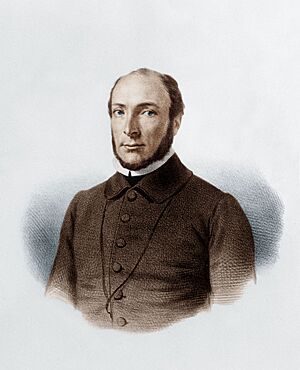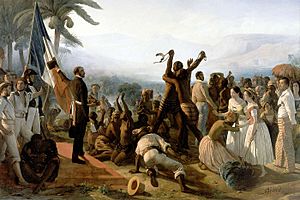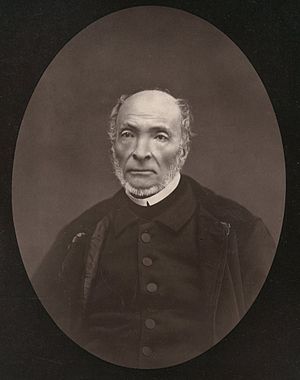Victor Schœlcher facts for kids
Quick facts for kids
Victor Schœlcher
|
|
|---|---|
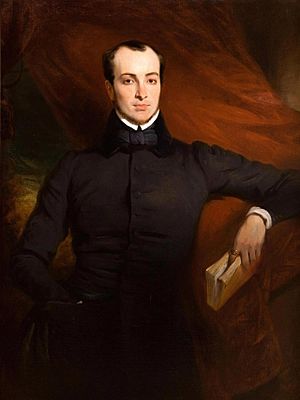
Portrait by Henri Decaisne, 1832
|
|
| Member of the National Assembly | |
| In office 9 August 1848 – 26 May 1849 |
|
| Constituency | Martinique |
| In office 24 June 1849 – 17 October 1849 |
|
| Constituency | Guadeloupe |
| In office 13 January 1850 – 2 December 1851 |
|
| Constituency | Guadeloupe |
| In office 12 March 1871 – 7 March 1876 |
|
| Constituency | Martinique |
| Personal details | |
| Born | 22 July 1804 Paris, France |
| Died | 25 December 1893 (aged 89) Houilles, France |
| Resting place | Panthéon |
| Political party | The Mountain (Second Republic) Republican Union (Third Republic) |
Victor Schœlcher (born 22 July 1804 – died 25 December 1893) was a French writer, politician, and journalist. He is most famous for his important role in ending slavery in France and its colonies in 1848. This happened during a time called the Second Republic.
Contents
Who Was Victor Schœlcher?
Victor Schœlcher was born in Paris, France, on July 22, 1804. His father, Marc Schœlcher, owned a porcelain factory. His mother, Victoire Jacob, worked as a laundry maid.
Victor went to a school called Lycée Louis-le-Grand for a year. After that, he started working at his family's porcelain factory. Even as a teenager, he did not like the ruling Bourbon monarchy. He often visited political discussion groups in Paris.
In 1820, at age 16, he joined a group called Freemasonry. This group was very involved in politics at the time.
How Victor Schœlcher Fought Against Slavery
In 1828, Victor's father sent him on a business trip to America. He traveled for 18 months, visiting places like Mexico, Cuba, and the southern United States. During this trip, he learned a lot about slavery. This experience made him want to fight against it.
When he returned to France in 1830, he wrote an article called Des noirs ("Of the blacks"). In this article, he suggested ending slavery slowly. When his father died in 1832, Victor took over the family business. However, he soon sold it to focus completely on his work against slavery.
His Travels and Changing Views
In the years that followed, Victor traveled a lot. In 1840, he went to the West Indies to study slavery there. He also looked at how slavery had ended in the British colonies.
Next, he visited Egypt, Greece, and Turkey to learn about slavery in those regions. Finally, he traveled to West Africa, visiting Senegal and Gambia between 1847 and 1848.
After all his travels, Schœlcher changed his mind. He no longer believed in ending slavery slowly. He became a strong supporter of ending slavery immediately. He wrote about this idea in his 1842 book, Des colonies françaises: Abolition immédiate de l'esclavage.
He was also a member of the "French Society for the Abolition of Slavery," which started in 1834. This group was similar to British groups fighting against slavery. Victor was also a republican activist in France. He helped start a newspaper called La Réforme in 1843 and wrote for it often.
Ideas for a Better Future
Schœlcher also thought about what would happen after slavery ended. He believed that sugar production could continue in the Caribbean colonies. He suggested building large central factories to make it more efficient. He also did not want a few rich people to own all the land.
He was the first European abolitionist to visit Haiti after it became independent. His ideas had a big impact on anti-slavery movements in all the French West Indies. He strongly opposed France collecting money from Haiti. This money was demanded by former French slave owners as payment for their "lost property" after the Haitian Revolution.
In February 1848, a revolution happened in France. This revolution ended the July Monarchy. Schœlcher arrived back from Senegal on March 3. He quickly met with François Arago, who was the Minister of the Navy and Colonies.
The next day, Arago made Schœlcher the under-secretary of state for the colonies. He also made him the head of a new group. This group's job was to write a law to end slavery right away.
Schœlcher convinced Arago not to wait for the new National Assembly to be elected. He argued that waiting could cause revolts and violence in the colonies. Because of his position, Schœlcher prepared and wrote the decree. This law was issued on April 27, 1848. It officially ended slavery in all French colonies and gave citizenship to the people who were freed.
Victor Schœlcher's Later Life
After successfully ending slavery, Schœlcher became a hero in the Caribbean colonies. He was elected to the National Assembly in 1848 by the people of Martinique. The next year, he lost his re-election bid in Martinique. However, he won in Guadeloupe and was elected again for that area in 1850.
He tried to pass a law to end the death penalty. But this discussion was stopped when President Louis-Napoléon Bonaparte took power in a coup d'état on December 2, 1851. This act dissolved the National Assembly. Schœlcher was one of the few politicians who tried to resist this coup in Paris.
Exile and Return
Because of his opposition, Schœlcher was forced to leave France. He lived in Belgium for a short time before moving to London in 1852. While in London, he became an expert on the composer Georg Friedrich Handel. He even wrote a biography about him in 1857.
He also wrote many articles criticizing Napoleon III, who was now the emperor of France. One of his works was Dangers to England of the alliance with the men of the Coup d'Etat (1854). During this time, he became good friends with another French exile, Victor Hugo.
Schœlcher refused to return to France when an amnesty was offered in 1859. He only came back in August 1870, after France declared war on Prussia. He was made a colonel in the National Guard on September 4. This was the day Napoleon III was removed from power and the Third Republic was declared.
He helped organize an artillery group and took part in the defense of Paris. In 1871, Martinique elected him again to the National Assembly. He voted against the peace treaty that ended the war. During the Paris Commune uprising, Schœlcher tried to help make peace between the rebels and the government. He was briefly put in prison by the rebels.
Afterward, he continued to serve in the National Assembly as part of the Republican Union. In December 1875, he was elected a senator for life.
In 1875, Schœlcher joined a group called the "Society for the improvement of women's condition." In 1876, he again proposed ending the death penalty. In 1882, he helped start a newspaper called Le Moniteur des Colonies.
Schœlcher published his last book in 1889. It was a biography of the Haitian revolutionary leader Toussaint Louverture. Victor Schœlcher died on December 25, 1893, at his home near Paris. He was 89 years old.
Victor Schœlcher's Legacy
Victor Schœlcher never married or had children. In his will, he gave his money and his collection of items to Guadeloupe. This collection is now in the Schœlcher Museum (Musée Schœlcher) in Pointe-à-Pitre.
He was first buried in the Père Lachaise Cemetery. But on May 20, 1949, his remains were moved to the Panthéon. The Panthéon is a famous building in Paris where important French people are buried. Schœlcher had wanted to be buried with his father, Marc, so his father's remains were also moved to the Panthéon. Félix Éboué, the first black person to be buried in the Panthéon, was also moved there at the same time.
In 1981, the new French President Francois Mitterrand placed a rose at Schœlcher's tomb. This was part of his inauguration ceremony.
Honoring Victor Schœlcher
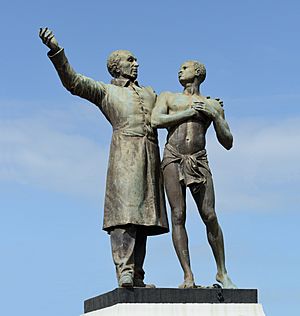
Many places and things have been named after Victor Schœlcher to honor his work against slavery:
- The town of Case-Navire in Martinique changed its name to Schœlcher in 1888.
- The town of Fessenheim turned his family's house into the Victor Schœlcher museum.
- A square in Aix-en-Provence is named Place Victor Schœlcher.
- A street in Paris, near the Montparnasse Cemetery, was named Rue Schœlcher in 1894.
- Two ships in the French Navy have been named Victor Schœlcher.
- On May 20, 2020, two statues of Schœlcher in Martinique were destroyed. French President Emmanuel Macron criticized these actions. Another statue was destroyed in March 2021. Some activists supported these actions as part of protests against "colonial memory."
- He was honored on a five thousand francs banknote issued in 1946 in Réunion.
Victor Schœlcher's Writings
Victor Schœlcher wrote many books and articles. Here are some of his important works:
- De l'esclavage des noirs et de la législation coloniale (On slavery of blacks and colonial legislation) (1833)
- Abolition de l'esclavage (Abolition of slavery) (1840)
- Les colonies françaises de l'Amérique (French colonies of America) (1842)
- Les colonies étrangères dans l'Amérique et Hayti (Foreign colonies in America and Haiti) (1843)
- Histoire de l'esclavage pendant les deux dernières années (History of slavery during the last two years) (1847)
- Vie de Händel (Life of Handel) (1857)
- Vie de Tousaint Louverture (Life of Toussaint Louverture) (1889)
See also
 In Spanish: Victor Schoelcher para niños
In Spanish: Victor Schoelcher para niños
 | Laphonza Butler |
 | Daisy Bates |
 | Elizabeth Piper Ensley |


